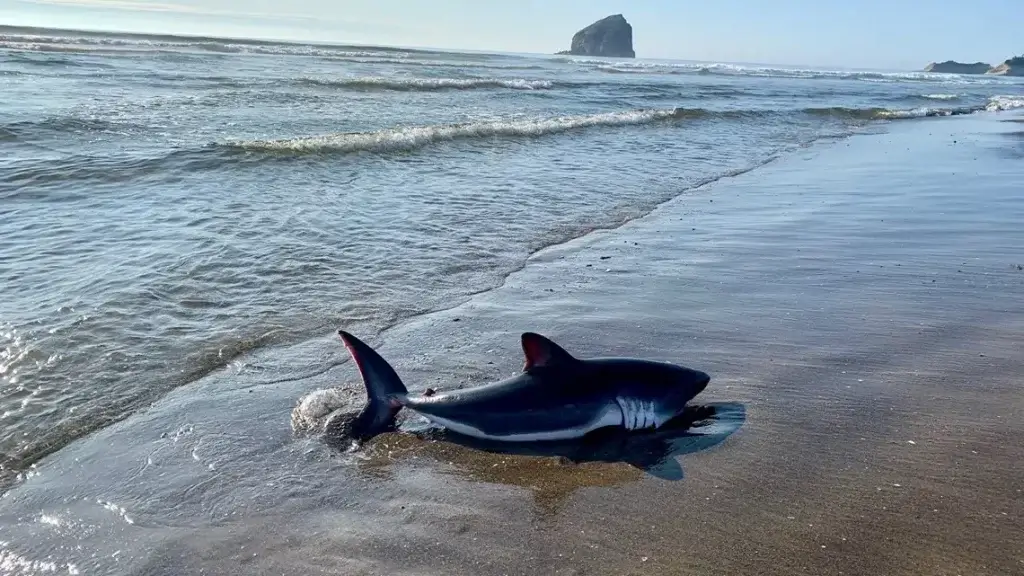Did you know that sharks can survive out of water for a surprisingly long time? In this blog post, we will explore how long can a shark be out of water and what happens to them when they are exposed to the air.
We will also discuss some myths about sharks and how they relate to being out of water. Sharks are an important part of our ocean’s ecosystem, and it is important to understand their biology to protect them.
Can Sharks Breathe on Land?
This is a common question that people have about sharks. Unfortunately, the answer is no – sharks cannot breathe on land.
However, they can survive out of water for a surprisingly long time. This is because sharks get their oxygen from the water, and when they are out of the water, they will suffocate.
How Long Can a Shark Survive Out of Water?

There is no definitive answer to this question, as it depends on the type of shark and how long they have been out of water.
However, sharks can survive out of water for a few hours or even days if necessary. For example, the nurse shark can survive out of water for four days.
It might come as a surprise to some, but sharks can survive outside of the water for a certain amount of time.
Depending on the species, sharks can generally be out of the water for about 15-20 minutes before they start to experience problems. If they are out of the water for longer than that, their gills will start to dry out, and they will eventually die.
This is why you often see sharks thrashing around in the water when they’ve been caught on a fishing line – it’s their way of trying to get back into the water as quickly as possible.
Sharks can survive outside of the water because they can breathe through their skin – but only for a limited amount of time.
The gills are essential for extracting oxygen from the water, so if they’re not in the water, they can’t breathe properly and will eventually die.
Interestingly, sharks can survive out of the water for longer than most other fish – probably because they are used to swimming long distances.
Some fish only need to be in the water for a few seconds to get their oxygen, but sharks have evolved to last longer without it.
It’s important to note that this is just a general guideline – some sharks can survive outside the water longer than others. The spiny dogfish shark, for example, can survive outside of the water for up to an hour.
So next time you’re at the beach and see a shark swimming around in the water, don’t worry – it’s not going to die if it leaves the water.
But make sure you stay out of its way – after all, they are still sharks, and they can bite.
What Happens to Sharks When They Are Out of the Water?
When a shark is out of the water, they will suffocate because they cannot breathe. However, it takes quite some time for them to die.
Some sharks have been known to survive up to four days without air. This is how long nurse sharks can go without any oxygen before dying from asphyxiation.
Other species can survive for shorter periods, such as the spiny dogfish shark, which has been known to live up to 24 hours outside of water before it dies from suffocation.
What Are Some Myths About Sharks?
There are many myths about sharks, but the interesting is how long a shark can be out of water. You might have heard that sharks can survive for days without oxygen, but this isn’t true.
The myth comes from how long nurse sharks can live on land before dying from suffocation or dehydration.
Why Can’t Sharks breathe Air?

Sharks are a unique species of fish that have been around for millions of years. They were the first creatures on Earth to develop jaws, which helped them eat larger prey and survive in an environment where predators were much bigger than themselves.
Sharks also have a unique organ called a “liver,” which helps them digest food.
However, the biggest difference between sharks and other fish is how they breathe. Sharks can only breathe in water; they cannot breathe air like most other fish.
This means that if sharks are out of the water for too long, they will suffocate and die.
This is one of the reasons why sharks are so often found in the ocean – it’s their natural habitat.
Sharks can stay in the water as cold as 50 degrees Fahrenheit, but they will start to suffocate if they are in water below 40 degrees for more than a few minutes.
Interestingly, though, sharks can breathe air when they need it. This is how they survive during low tide or in areas without much oxygen due to pollution or other factors.
Sharks also have gills that allow them to take oxygen from the water around them and use it for energy production inside their bodies.
These gills are how sharks breathe – they take in water, pass it over the gills, and extract the oxygen from the water.
This is why sharks need to be in the water all the time; if they were out of water for too long, they would not be able to breathe.
Do You Punch a Shark in the Nose or Eye If It Attacks You in the Water?
-This is a question that many people have asked, and the answer is no. You should not punch a shark in the nose or eye if it attacks you in the water.
Although this may seem like the logical thing to do, it will not work and could potentially make the situation worse.
-If a shark attacks you, you should try to hit it on the nose or gills. These are its most sensitive areas. If you cannot reach these areas, go for the eyes or mouth.
Remember, do not waste time trying to remove clothing; focus on defending yourself from the shark.
-Sharks are not invincible, and they can be killed. However, if you can defend yourself from an attack, do so. Use whatever is available to a knife, a rock, your fists. The most important thing is to stay safe and alive.
What to Do If a Shark Is Chasing You

If a shark is chasing you, how long should you survive? Some people think they will be safe if they can get out of the water and onto dry land.
But how do sharks behave in this situation? Are sharks adapt quickly to different environments, or are their senses limited when faced with unfamiliar surroundings? The answer may surprise you.
Most sharks can survive out of water for some time, but it is not as long as you think. This is because sharks breathe through their gills and need to be in the water to do so.
If they are out of the water for too long, they will die. For example, the longest time a shark has been known to survive out of the water is about an hour.
But how does a shark behave when it is out of the water? Sharks can sense movement in their environment and usually go after anything like prey.
But if they are out of the water, their senses are limited, and they may not identify what food is and what isn’t. So does this mean that if a shark is chasing you, how long should you survive?
The best way to find out how long a shark can be out of water is to time yourself when swimming in the ocean or another body of water with sharks present.
If there aren’t any sharks near you, you can try to find a video online of a shark being out of water. This will help you understand how long the average shark can survive without swimming.
If a shark is chasing you, remember that they are attracted to movement. So try to stay calm and still until the shark goes away.
If the Shark Is Out of the Water, How Should You Escape It?
The best way to avoid being attacked by a shark is to swim away. Try not to splash around too much and try not to make any sudden movements while swimming in the ocean or other bodies of water with sharks present.
Sharks are attracted to movement, and if you make too much noise or movement, they may think you are prey.
If a shark is chasing you and you cannot get away, try to find a place to hide underwater. If there is nowhere to go, the best thing to do is fight back.
Use any object you can find to defend yourself and make as much noise as possible. Sharks are usually more interested in weak or injured prey, so if you can put up a good fight, the shark may leave you alone.
Remember, the best way to avoid being attacked by a shark is to stay calm and swim away from them.
Conclusion
The bottom line is that sharks can survive out of water for a surprisingly long time, but they do need to come up for air eventually.
How often they need to surface depends on the type of shark and how deep it is swimming, but most sharks only need to breathe every few minutes.
So if you’re ever lucky enough to spot a shark in the wild, don’t worry – it’s not going to die just because it left the water.
That said, a few sharks can survive out of water for extended periods. For example, the giant whale shark can go for more than two hours without coming up for air, and some species of deep-diving sharks can stay underwater for up to an hour.
But for the most part, sharks need to come up for a breath of air every few minutes – so if you’re swimming with them, be sure to keep an eye on the surface.
